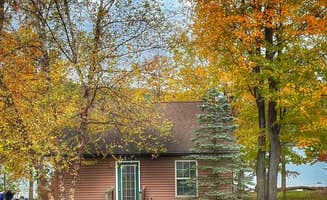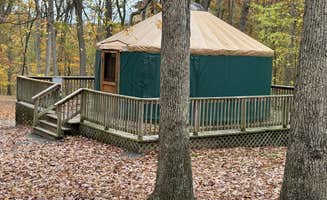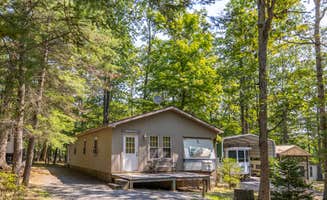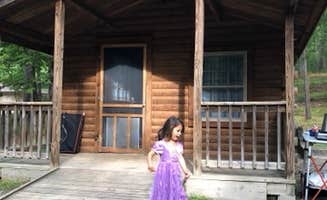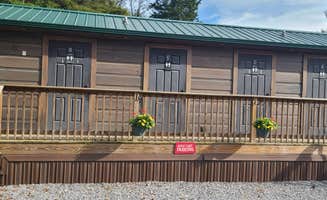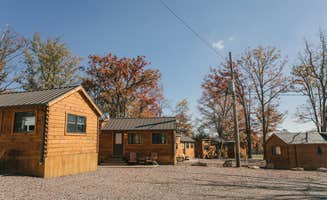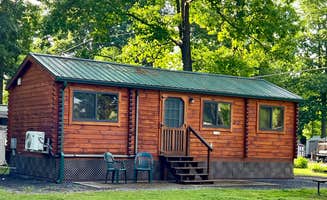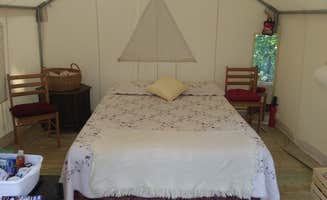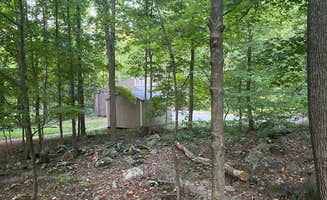Glamping options near Wells Tannery, Pennsylvania can be found within 30 miles of this central Pennsylvania location. The area sits at approximately 1,200 feet elevation in the Appalachian Mountains, with rolling terrain creating microclimates that affect camping conditions throughout the year. Winter temperatures regularly drop below freezing, making late spring through early fall the primary camping season.
What to do
Mountain biking at Raystown Lake: The Allegrippis Trail system begins just above the Ridge camp loop at Seven Points (PA) and offers miles of singletrack. "A lot to do here in the water or on the trails. This loop is our favorite of the choices at Raystown," says Travis S., who notes the trails "provide a full day of fast flowing singletrack" and remain open in all weather conditions.
Swimming at rocky beaches: The eastern shore of Raystown Lake features multiple swimming areas beyond the main beach. "The lake is so clean and refreshing and we have such beautiful views from our camp site. We went down to the swim beach and our kiddo made sand castles and swam in the clear water," mentions Jennifer D. about her experience at Seven Points.
Historic site exploration: Visit the nearby Burnt Cabins Grist Mill, a restored 18th-century mill near Ye Olde Mill Campground. The site offers tours of working mill equipment and historical exhibits. "Superb campground with water and electricity hookups! Playground for children and creek access for fishing!" reports Kristen H.
What campers like
Lakefront camping options: Susquehannock offers primitive lakeside sites where campers can directly access the water. "Very cool camp. Loops for RVs, higher on the hill, waterfront loops on steeper grounds for tents, and some walk-to sites adjacent to parking right at the point which double as boat-in. Some site right on the water, can walk right into the lake," explains Ian W.
Spacious, wooded sites: Rocky Gap State Park Campground offers generous spacing between sites. "Can't believe how much space is between each site. You're close enough to see other campers but far enough away to feel you have you own sections of woods," notes Jeff H., who stayed in the Ironwood loop. The park provides a mix of cabin and tent camping with bathhouses centrally located in each loop.
Family-oriented amenities: Campgrounds in the area feature playgrounds, organized activities, and beach facilities. "Katie H. describes Rocky Gap: "We love that the campground has their own beach so it's not over crowded with the public. Near the beach there is a nice playground near shade for parents to watch. I really like that there are trails from the camp loops to the beach."
What you should know
Water quality varies: Some campgrounds have limited or seasonal water access. At Trough Creek State Park Campground, one camper reported issues: "The 'water hookup' was BROWN. The bathroom has no lights or sink..." This contrasts with other campgrounds in the region that have reliable water systems.
Cell service limitations: Coverage is inconsistent across the region. While some areas maintain connections, many camping areas have minimal or no service. Brian C. at Cowans Gap noted: "Cell service was limited, but had reliable (but low) signal with T-Mobile at my site."
Generator noise: At some campgrounds, equipment noise can be an issue. Brian C. mentioned at Cowans Gap: "The major negative was generator noise coming from the facility just beyond the dam. Droning generator noise was on/off at all hours of the day and went on until 10pm in the evening."
Tips for camping with families
Book waterfront sites early: The most desirable lake sites fill quickly, especially for summer weekends. "We wanted a waterfront spot, and although we booked over a month in advance none were available," reports Jennifer R. about Susquehannock Campground, suggesting that families should reserve several months ahead for prime locations.
Consider the bathroom proximity: When glamping with children, bathroom facilities become important. "The bathhouse at Ridge has 4 shower stalls which were very clean with hot water at a great water pressure," notes Tim J. at Lake Raystown Resort, where he appreciated the well-maintained facilities despite the campground being full.
Look for campground activities: Many locations offer scheduled events that keep children engaged. Dawn N. says about Lake Raystown Resort: "Both RV sites and lots to rent to pitch your own tent, fishing, huge lake with beach, lots of activities for the kids throughout the summer, one of the nicest parks we have camped at!"
Tips from RVers
Check site dimensions carefully: Many RV sites in the region have unexpected layouts or size restrictions. "We have a 35' TT and there was no way it was going to fit in the site we originally booked," writes Brittany V. about Shawnee State Park Campground. She advises looking beyond the listed site length to consider trees, slopes, and pad width.
Utilize dump stations: The region's campgrounds often feature well-designed facilities. Tim J. notes about Seven Points: "We filled up the fresh water tank at the ultra-cool 4 lane dump station... The dump station, as noted above had wide lanes and made the experience an easy and clean one."
Site leveling can be challenging: Many campgrounds in the mountainous terrain have uneven sites. At Shawnee State Park, Kaley R. observed: "There are a fair amount of awkwardly-placed sites that sit on a hill and are difficult to place a tent, equipment or gear." Bringing additional leveling blocks is recommended for RVs.


